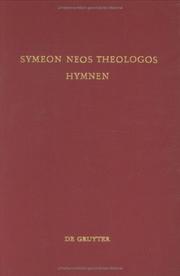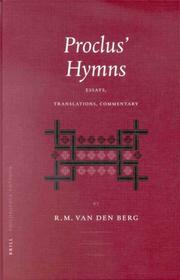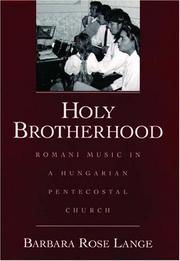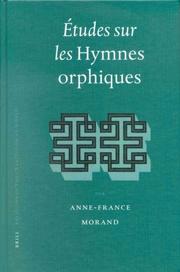| Listing 1 - 8 of 8 |
Sort by
|

ISBN: 3110048884 3110833441 9783110048889 Year: 1976 Volume: 3 Publisher: Berlin ; New York, NY : De Gruyter,
Abstract | Keywords | Export | Availability | Bookmark
 Loading...
Loading...Choose an application
- Reference Manager
- EndNote
- RefWorks (Direct export to RefWorks)
Hymns, Greek --- Hymns, Greek. --- Greek hymns --- Hymns, Byzantine --- Hymnes grecs.
Book

ISBN: 2713226082 2713223660 Year: 2017 Publisher: Paris-Athènes : Éditions de l’École des hautes études en sciences sociales,
Abstract | Keywords | Export | Availability | Bookmark
 Loading...
Loading...Choose an application
- Reference Manager
- EndNote
- RefWorks (Direct export to RefWorks)
Dossier : Comment agit-on par la parole dans un cadre ritualisé ? Les pratiques des mondes anciens étudiées sont l'occasion de repenser notre monde contemporain. À travers des processus de ritualisation, de « solennisation » et de formalisation, ce volume étudie la manière dont des actes de langage particuliers ont acquis la capacité de lier des personnes dans des unions durables (le mariage, l’alliance, l’adoption ou le contrat) ; de transmettre la connaissance du passé avec certitude et fidélité (le témoignage juridique) ; ou de garantir des actions à venir dans une totale confiance (le gage, la promesse et le vœu). Varia : Histoire et anthropologie religieuse (sphères d'action et modes d'épiphanie divine, oracles et politique, les agalmata, le daimôn du stoïcisme impérial). Questions d'anthropologie (comparatisme Grèce/Chine : la raison pratique ; le geste de Phryné ; les vases à prédelle ; la « féminité » des arbres : Varron, Ovide).
Religion --- History --- serment --- vœux --- vœu d’abstinence --- langage --- témoignage divin --- témoins humains --- offrande musicale --- Hymnes homériques --- katadesmoi --- kolossoi --- ornement --- malédiction réflexive --- rituel --- statue --- corps --- poitrine --- Phryné --- démocratie --- Éleusis --- Parthenos --- Varron --- Ovide --- métamorphose --- daimôn --- oath --- vows --- language --- divine witnessing --- abstention vow --- poetics and pragmatics --- sacrifice --- ritualization --- ritual --- charis --- beauty --- Phryne --- democracy --- Delphic oracle --- epiphany --- metamorphosis

ISSN: 00791687 ISBN: 9004122362 9789004122369 9786610464869 1417507233 1280464860 9047401034 9781417507238 9789047401032 Year: 2001 Volume: 90 Publisher: Leiden Boston Brill
Abstract | Keywords | Export | Availability | Bookmark
 Loading...
Loading...Choose an application
- Reference Manager
- EndNote
- RefWorks (Direct export to RefWorks)
This book studies the hymns composed by the Neoplatonist Proclus in the context of his philosophy. Its main claim is that the hymns should be understood in the context of theurgy, the ritual art adopted by the Neoplatonists in order to obtain mystical experiences. The first part of the book consists of a series of essays which discuss the relation of the hymns to Proclus’ Neoplatonism, his theory of poetry, and especially to theurgy. The second part offers translations of the individual hymns together with a detailed commentary. This study will be of special interest to those working in the field of Neoplatonism and a helpful guide to scholars of Late Antique poetry and religion who wish to explore these intriguing, yet at times obscure poems.
Hymns, Greek (Classical) --- History and criticism. --- -History and criticism --- Proclus --- Hymnes grecs anciens --- History and criticism --- Histoire et critique --- Proclus, --- Proclo, --- Proclo di Atene, --- Proclo di Costantinopoli, --- Proclo Licio Diadoco, --- Proclus Arabus, --- Proclus Diadochus --- Proclus Diadochus, --- Proclus Lycius, --- Prokl, --- Prokl Diadokh, --- Proklos, --- Proklos Diadochos, --- Proklus, --- Πρόκλος, --- Πρόκλος Πλατωνικός Διάδοχος, --- Πρόκλος Διάδοχος, --- פרוקלוס --- Hymns [Greek ] (Classical) --- Hymns, Greek (Classical) - History and criticism.

ISBN: 1280834609 0195343948 9780195343946 9781280834608 9786610834600 6610834601 9780195137231 019513723X 019513723X 019772812X Year: 2003 Publisher: Oxford ; New York : Oxford University Press,
Abstract | Keywords | Export | Availability | Bookmark
 Loading...
Loading...Choose an application
- Reference Manager
- EndNote
- RefWorks (Direct export to RefWorks)
'Holy Brotherhood' is a musical ethnography of a religious community. Including interviews with Romani individuals, the text addresses US cultural influence in Eastern Europe throughout the 20th century.
Romanies --- Pentecostals --- Bohemians (Romanies) --- Gipsies --- Gitanos --- Gypsies --- Kalderash --- Manush --- Roma (People) --- Romani --- Sinti --- Nomads --- Pentecostalists --- Pentecostal churches --- Music --- History and criticism. --- Hymns --- History. --- Religion. --- Isten Gyülekezet (Pécs, Hungary) --- Assembly of God (Pécs, Hungary) --- Hungary --- Ethnic relations. --- 78.34.5 --- 78.94 --- Tsiganes --- Pentecôtistes --- Pentecotistes --- Musique --- Histoire et critique --- Hymnes --- Histoire --- Religion --- Hongrie --- Ethnic relations --- Relations interethniques --- Isten Gy�ulekezet (P�ecs, Hungary) --- Isten Gyulekezet (Pecs, Hungary)

ISSN: 09277633 ISBN: 9004120300 900430150X 9789004120303 Year: 2001 Volume: 143 Publisher: Leiden Brill
Abstract | Keywords | Export | Availability | Bookmark
 Loading...
Loading...Choose an application
- Reference Manager
- EndNote
- RefWorks (Direct export to RefWorks)
The book is a study of the Orphic Hymns , a collection of 87 Greek texts in hexameter addressed to various deities. These hymns are closely related to one another and seem to originate in Asia Minor during the first centuries of the Christian era. The great originality of this corpus is that a link can be traced between a set of beliefs, rituals, offerings and mysteries, and a group of believers. Surprisingly the Hymns has been generally neglected. Les études sur les Hymnes orphiques begins with a study of the genre. The Hymns are essentially composed of long lists of epithets and are therefore distinctive. Through the choice of epithets in the different hymns and a comparision between the different texts it is possible to trace allusions to myths, to rituals and to mysteries related to the gods. This first part also concentrates on the literary ways of expressing religious ideas. The group using this text referred to the legendary figure Orpheus as the composer of the Hymns . It is therefore not surprising to find Dionysos at the center of this text. The basic approach is to compare the content of the Hymns to what we know and do not know about orphism. Questions such as vegetarianism, prohibition of beans, belief in metempsychosis, the content of the mysteries arise. It may seem awkward to find typically orphic gods, such as Protogonos, next to traditional gods and local deities from Asia Minor. Finally, the group was organised and the participants bore titles such as boukolos , the oxherd. A large place is given to epigraphy. The aim is to fit these elements to a definition of orphism during the first centuries of our era and to put together an image of this particular group. This book will be essential to scholars interested in orphism, in Greek religion, in religion at the beginning of Christianity, in literature and in hymns.
Ancient philosophy --- Antieke filosofie --- Filosofie [Antieke ] --- Filosofie [Griekse ] --- Filosofie [Romeinse ] --- Filosofie van de Oudheid --- Greek philosophy --- Griekse filosofie --- Philosophie ancienne --- Philosophie antique --- Philosophie de l'Antiquité --- Philosophie grecque --- Philosophie romaine --- Philosophy [Ancient ] --- Philosophy [Greek ] --- Philosophy [Roman ] --- Roman philosophy --- Romeinse filosofie --- Hymns, Greek (Classical) --- Hymnes grecs anciens --- History and criticism --- Histoire et critique --- Orphic hymns --- Dionysia. --- Dionysia --- 881 --- 292.38 --- Orphic mysteries --- Orphism --- Cults --- Literature Greek Classical Greek poetry --- Religion Classical Greek and Roman Rites and ceremonies --- Orphica --- Poesia Orphica --- Khimnite na Orfeĭ --- Hymni Orphici --- Orphei hymni --- History and criticism.
Book
ISBN: 9782960071726 2960071727 2821829078 Year: 2013 Volume: 19 Publisher: Liège : Presses universitaires de Liège,
Abstract | Keywords | Export | Availability | Bookmark
 Loading...
Loading...Choose an application
- Reference Manager
- EndNote
- RefWorks (Direct export to RefWorks)
Quiconque s’intéresse à la religion grecque antique utilise la thèse que Jean Rudhardt a publiée en 1958 : Notions fondamentales et actes constitutifs du culte. Étude préliminaire pour aider à la compréhension de la piété athénienne au IVe siècle. À cet ouvrage toujours indispensable sont venues s’ajouter de nombreuses publications qui continuaient d’explorer le champ du polythéisme grec en l’appréhendant de l’intérieur, dans le respect du contexte qui le voyait se déployer. Parmi les textes laissés en chantier par Jean Rudhardt, trois livres étaient en préparation, auxquels il aura travaillé jusqu’à sa mort, en juin 2003. Deux d’entre eux, inachevés mais parfaitement cohérents, représentent deux volets essentiels des travaux du savant genevois, l’un intitulé Essai sur la religion grecque, l’autre Recherches sur les Hymnes orphiques. Les lecteurs de Jean Rudhardt retrouveront la démarche philologique rigoureuse qui caractérise ses recherches depuis les Notions fondamentales. Au cœur de ces deux inédits est posée, dans une perspective interne, la question du sens. Cette question le faisait s’écarter de l’ensemble des spéculations modernes pour se tourner vers la considération du vocabulaire religieux des Grecs eux-mêmes. Une telle méthode d’investigation du polythéisme grec, mise en œuvre dès 1958, témoigne une fois encore de sa fraîcheur et de sa pertinence.
Orpheus (Greek mythology) --- Orphée (Mythologie grecque) --- Greece --- Grèce --- Religion --- History --- Histoire --- Mythology, Greek --- Gods, Greek, in literature --- Orpheus --- In literature --- Gods, Greek, in literature. --- Hymns, Greek (Classical) --- Mythology, Greek. --- Orpheus (Greek mythology) in literature. --- History and criticism. --- Orpheus (Greek mythology). --- Orphée (Mythologie grecque) --- Grèce --- Orpheus (Greek mythology) in literature --- Greek mythology --- History and criticism --- Religion. --- Orphic hymns --- In literature. --- Ορφεύς --- Арфей --- Arfeĭ --- Орфей --- Orfeĭ --- Orfej --- Orfeüs --- Orfeu --- Ορφέας --- Orpheas --- Orfeo --- Orphée --- 오르페우스 --- Orŭp'eusŭ --- אורפאוס --- Orfėjas --- Orpheusz --- Орфеј --- オルペウス --- Orfeusz --- Orfe --- 俄耳甫斯 --- Eerfusi --- Orpheus - (Greek mythological character) - In literature --- Orpheus - (Greek mythological character) --- Greece - Religion --- hymnes orphiques --- piété --- religion grecque antique --- Polythéisme --- Religion grecque
Book
ISBN: 9782960071702 2960071700 2821829051 Year: 2007 Volume: 17 Publisher: Presses universitaires de Liège
Abstract | Keywords | Export | Availability | Bookmark
 Loading...
Loading...Choose an application
- Reference Manager
- EndNote
- RefWorks (Direct export to RefWorks)
Hermès est le fils de Zeus et de l’Atlantide Maïa. En disant la naissance et les exploits du jeune dieu, l’Hymne homérique à Hermès dessine, sous l’angle compréhensif d’un récit théogonique et théologique, un combiné de puissances en actes : l’histoire du surgissement d’un dieu parmi les autres dieux. C’est ici le mode - énigmatique, parfois comique ou inquiétant - autant que les faits, qui racontent Hermès, non pas comme ce dieu « mineur » trop proche des hommes pour être pleinement divin, mais comme la puissance souveraine de l’espace intermédiaire des passages. Dans le jeu polythéiste, une telle puissance est susceptible d’agir en tout lieu où une liaison est nécessaire. Il est dans la « part » d’Hermès de concilier les pôles hétérogènes, le visible et l’invisible, le préalable et l’accompli, de naviguer entre les espaces relégués du cosmos, les âges anciens, et l’ordre de Zeus. Mais il importe de saisir également, au-delà de ses domaines d’action « institués », la présence du dieu parmi les puissances à l’œuvre en amont des grandes médiations qui scellent la relation des hommes aux dieux : le sacrifice, l’inspiration poétique ou prophétique, l’organisation de l’espace civique. Dans l’agôn où se négocient les prérogatives d’Hermès et de son puissant frère Apollon, au second est attribuée une maîtrise souveraine de la mantique, de la musique et des troupeaux, et à Hermès, solidairement et dans l’ordre du préalable, l’invention initiale de la lyre, le travail sous-jacent d’harmonisation qui conditionne la réalisation du chant poétique, de la mémoire prophétique et du rite. Cet ouvrage explore, non une figure abstraite, reconstituée, d’Hermès, mais une série de positions et de modes d’actions, un ensemble de configurations spécifiques qui, de l’Hymne à d’autres contextes mythiques ou rituels, énoncent Hermès au plus près de l’expérience, pour nous perdue, du polythéisme grec.
Hermes (Greek deity) --- Mythology, Greek --- Hermès (Divinité grecque) --- Mythologie grecque --- Greece --- Grèce --- Religion. --- Religion --- Classical Greek mythology --- Hermes --- 292.211 --- Religion Classical Greek and Roman Gods, goddesses, divinities and deities --- Mythologie grecque. --- Kult. --- Theogonie. --- Hermes (Greek deity). --- Hermès (Divinité grecque). --- Hermès (Divinité grecque) --- Grèce --- Hermès (Greek deity) --- Argeiphontes --- Гермес --- Хермес --- Khermes --- Ερμής --- Ermēs --- Hermeso --- Heirméas --- 헤르메스 --- Herŭmesŭ --- הרמס --- Germes --- Herme --- Hermejs --- Hermis --- Hermész --- ヘルメース --- Hermesi --- 赫耳墨斯 --- He'ermosi --- Mercury --- Hymne à Hermès. --- In Mercurium. --- Greece - Religion --- Hymnes homériques --- Théogonie --- Religion grecque --- Hermès --- Culte
Book
ISBN: 1575068931 9781575068930 9781575062808 1575062801 Year: 2021 Publisher: University Park, PA
Abstract | Keywords | Export | Availability | Bookmark
 Loading...
Loading...Choose an application
- Reference Manager
- EndNote
- RefWorks (Direct export to RefWorks)
Hittite culture of the second millennium B.C.E. was strongly influenced by Mesopotamian culture, in part through the mediation of the peripheral cuneiform civilizations of northern Syria, in part through direct contact with Babylonia and Assyria. The text edited here (CTH 718) presents an extreme example of this cultural impact, featuring incantations in the Akkadian language (Hittite babilili) embedded within a ceremony set forth in the Hittite tongue. This ritual program has therefore become known to scholars as the "babilili-ritual." With almost 400 preserved lines, this ceremony is one of the longest religious compositions recovered from the Hittite capital, and there are indications that a significant additional portion has been lost. The divine figure to whom the rite is addressed is Pirinkir, a variety of the well-known Ishtar of Mesopotamia. Its purpose seems to be the elimination of the sins of a member of the royal family. Many of the ritual activities and offering materials employed here are characteristic of the cult practice of the Classical Cilician region known as Kizzuwatna, which was introduced into the central Hittite realm during the final two centuries of the state's existence. Nonetheless, the Akkadian of the incantations is neither the Akkadian employed in the Hurrian-influenced area of Syria and eastern Anatolia nor that otherwise known from the Hittite royal archives; rather, it is closer to the language of the later Old Babylonian period, even if no precise Mesopotamian forerunners can yet be identified.
Hittites --- Akkadian language --- Religion. --- Kizzuwatna (Cilicia) --- Akkadian language. --- Akkadien (langue) --- Religion hittite. --- Accadian language --- Assyrian language --- Assyro-Babylonian language --- Babylonian language --- Semitic languages --- Religion, Primitive --- Atheism --- Irreligion --- Religions --- Theology --- Textes. --- Texts. --- Kizzuwatna (royaume) --- Histoire --- Sources. --- Mythologie hittite --- Temples hittites --- Dieux hittites --- Accadien (langue) --- Assyrien (langue) --- Assyro-babylonien (langue) --- Babylonien (langue) --- Sémitique oriental (langue) --- Akkadien --- Correspondance akkadienne --- Dictionnaires akkadiens --- Emprunts akkadiens --- Glossaires et lexiques akkadiens --- Grammaire comparée --- Hymnes akkadiens --- Incantations akkadiennes --- Incantations assyro-babyloniennes --- Inscriptions akkadiennes --- Littérature assyro-babylonienne --- Noms de personnes akkadiens --- Noms géographiques akkadiens --- Philologie akkadienne --- Langues sémitiques --- Religion --- langue) -- Vocabulaire --- Kizzuwadna (Royaume) --- Kizzuwatna (Royaume) --- Asie Mineure --- Kizzuwatna (Kingdom)
| Listing 1 - 8 of 8 |
Sort by
|

 Search
Search Feedback
Feedback About UniCat
About UniCat  Help
Help News
News